7 things former EPA, Army officials are saying about Clean Water Act rollback
Six former senior government officials from the U.S. Environmental Protection Agency and the Department of the Army today condemned the Trump administration’s plan to gut long-established clean water protections. The administration’s final rule, published today in the Federal Register, severely limits the waterways that are protected by the Clean Water Act, undercutting clean water protections that have prevented unchecked pollution from entering our waterways and drinking water sources for nearly 50 years.
Here’s what they had to say:
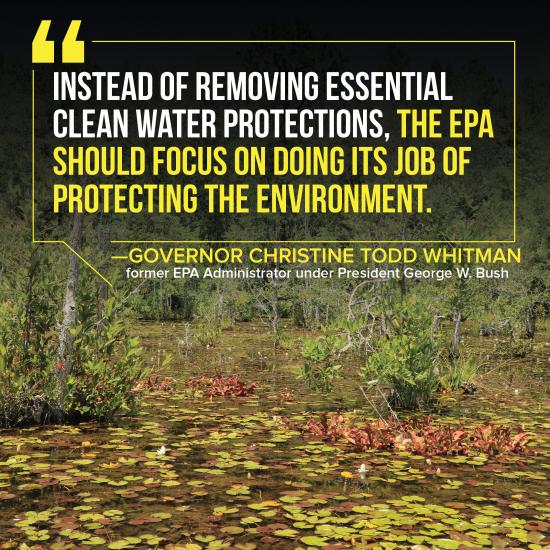
Republicans worked together with Democrats in Congress to pass the Clean Water Act because our rivers were so polluted, they were literally catching on fire, and Americans demanded action from our government. For nearly 50 years since, this landmark legislation has protected America’s families and communities by preventing unchecked and unlimited pollution from contaminating our waterways and drinking water sources. Instead of removing essential clean water protections, the EPA should focus on doing its job of protecting the environment.
Governor Christine Todd Whitman, former EPA Administrator under President George W. Bush
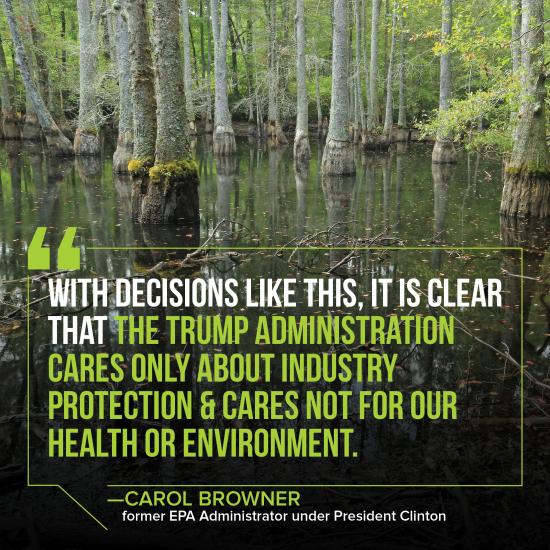
The EPA’s scheme to eliminate critical clean water protections and undermine the Clean Water Act completely ignores science and the warnings of the administration’s own science advisors. The administration would imperil the health of our children and safety of our drinking water by giving big polluters a free pass to dump toxins into our waterways and remove cops on the beat to enforce the law. With decisions like this, it is clear that the Trump administration cares only about industry protection and cares not for our health or environment.
Carol Browner, former EPA Administrator under President Clinton
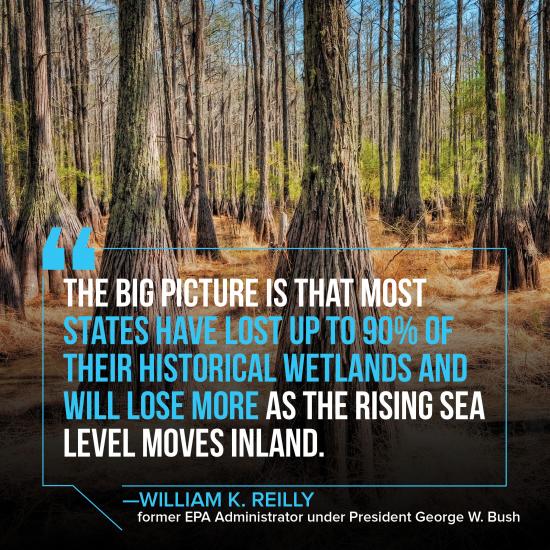
Thanks to President George H.W. Bush’s pledge for no net loss of wetlands, which I pursued as EPA Administrator, I thought we had addressed the value of wetlands. The administration’s proposal may offer short term relief to some economic sectors, but it is the wrong step today when we face extreme weather events and other potential threats from a changing climate. We need to preserve and protect for the long haul the natural systems on which our well-being depends, our economy included. The big picture is that most states have lost up to 90% of their historical wetlands and will lose more as the rising sea level moves inland. These are the nurseries and habitat of shore birds, ducks, and juvenile fish and their numbers will fall.
William K. Reilly, former EPA Administrator under President George W. Bush

Sabotaging the Clean Water Act flies in the face of years of scientific study and public input, but it’s exactly what the EPA’s latest plan does. Our rivers, lakes and drinking water sources are only as clean as the smaller waters that feed into them. Eroding the protections that keep them safe is a grievous mistake that will put American communities across the country at risk. The Trump Administration cannot hide behind the guise of providing clarity; its only guiding principle is to undercut the landmark law that protects our waters from pollution.
Jo-Ellen Darcy, former Assistant Secretary of the Army for Civil Works under President Obama
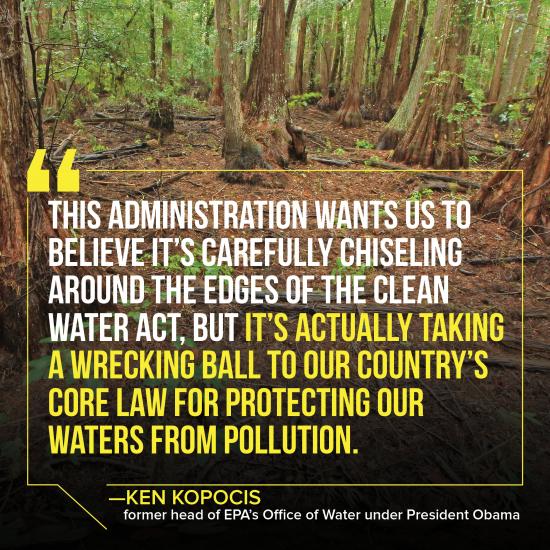
This administration wants us to believe it’s carefully chiseling around the edges of the Clean Water Act, but it’s actually taking a wrecking ball to our country’s core law for protecting our waters from pollution. You simply cannot strip away protections from millions of miles of streams and vast tracts of wetlands and claim you’re keeping our waterways safe.
Ken Kopocis, former head of EPA’s Office of Water under President Obama
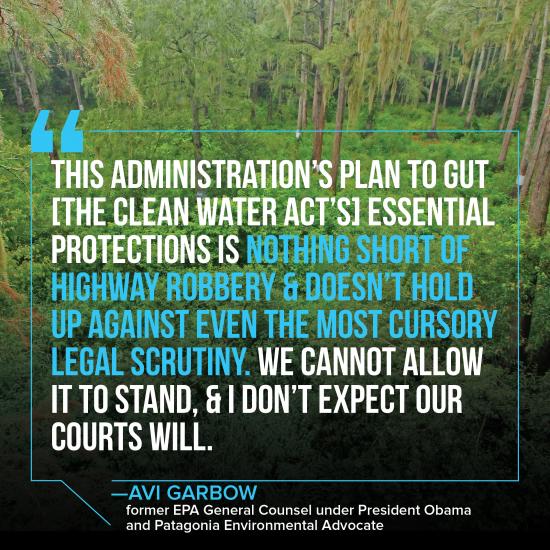
The Clean Water Act is a science-based, bipartisan achievement that has safeguarded communities across the country for nearly fifty years. This administration’s plan to gut its essential protections is nothing short of highway robbery and doesn’t hold up against even the most cursory legal scrutiny. We cannot allow it to stand, and I don’t expect our courts will.
Avi Garbow, former EPA General Counsel under President Obama and Patagonia Environmental Advocate
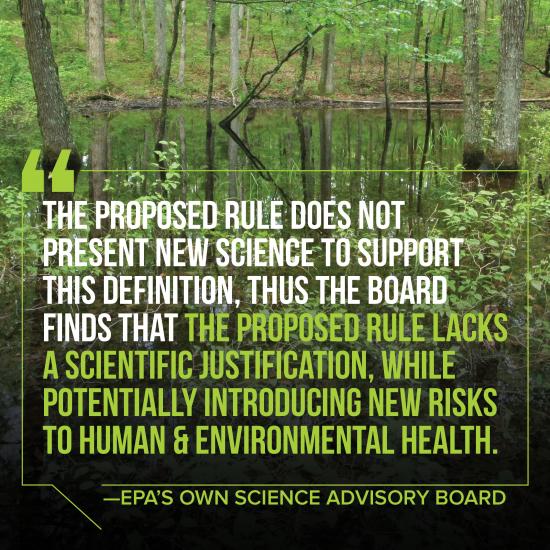
The proposed Rule does not present new science to support this definition, thus the Science Advisory Board finds that the proposed Rule lacks a scientific justification, while potentially introducing new risks to human and environmental health.
The EPA’s own Science Advisory Board, consisting mostly of scientists appointed by this administration, in its final report
The final rule published by the EPA today is the latest development in the administration’s two-step effort to roll back the Clean Water Act. Last year, the EPA repealed the 2015 Clean Water Rule, which clarified critical Clean Water Act protections for rivers, lakes, streams and other waters that feed drinking-water sources for 200 million Americans. Conservation groups, including SELC, have since challenged this repeal in federal court.
By further decimating crucial Clean Water Act protections, the EPA is making pollution worse, violating Supreme Court precedent and decades of well-established agency practice, and embracing an approach Congress explicitly rejected when it passed the bipartisan Clean Water Act in 1972. The overwhelming majority of more than 600,000 comments received by EPA opposed the rule.
SELC plans to file a lawsuit challenging the rule now that it has published in the Federal Register.
